This is how a horse should get onto a trailer. Blasé.
Easier said than done.
A horse has good reason to be wary of getting onto a trailer. Here’s a partial list:
The ramp and floor sound hollow. Horses like solid ground.
Simply walking on causes it to move slightly.
It’s an enclosed space.
There are noises – chains rattling, hinges squeaking.
There are unknown smells.
But horses are amenable, curious animals. Introduce a horse that trusts you to a trailer, and use carrots and patience, and the horse will learn to walk on and off with ease.
But what happens when that trust is broken? This horse (let’s call him Dee) used to self-load (what Tonka did in that video – walk on by himself.) The trailering itself wasn’t scary – but it took him someplace that was. He was trailered to a clinic where the “trainer” “taught” him “respect” (the quotation marks tells you what I think about that!) When I met Dee, just looking at the trailer made him tense, and if you pressured him anywhere near it, he’d react suddenly and dangerously.
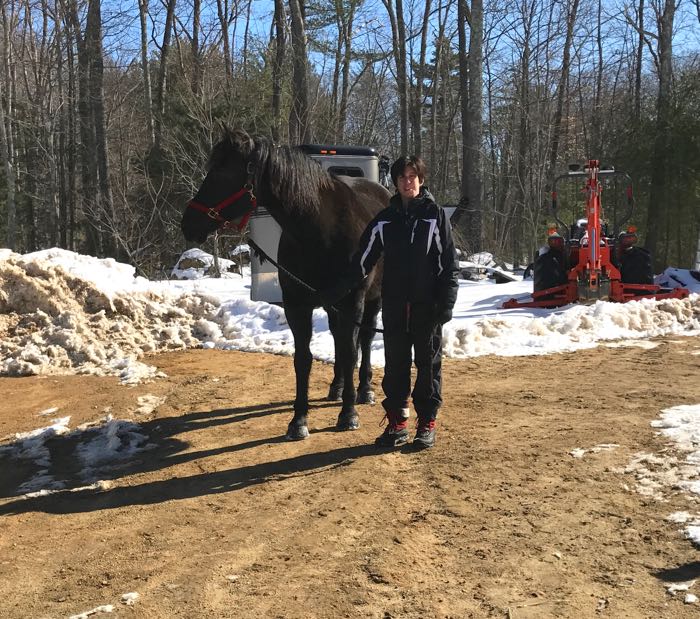
Whenever I meet a nervous horse, I think of the game of dominoes. Which is the first one that tips the rest into motion? Training should start from before that domino. I can, using treats and pressure, get a horse to do what I want even if they are tense. But training that creates a thinking horse that is trusting in new situations can only start from relaxation. (This is true, too, of the best dressage training. Forward energy doesn’t come from being hyper, but from a state of calm!)
I asked Dee where he was comfortable. It turned out that the anxiety started well before he was out the barn door. In fact, standing in the barn aisle, facing away from the paddock where his horse friends were, was that first domino. Leaving the barn had bad associations, and not just for Dee. This is a massive gelding. He’s learned how to plow past his handler to get back to safety. If you try to hold him in place, you have 1,500 pounds of explosive energy on the end of your lead rope. Once a handler anticipates that, the tension on the line starts even before the first jigging step. Things snowball.
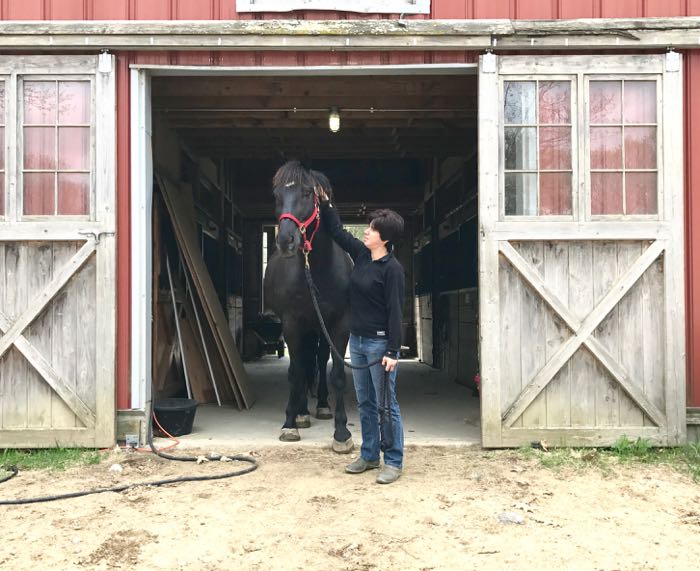
Dee lives in a well-kept barn in the backyard of his owner’s home. She interacts with him daily, and is a kind and experienced horsewoman, and yet I noticed that when he became nervous he did not look to her for reassurance. There was a disconnect. My goal is to have an on-going dialog with my horse. There will always be something out there in the wide world that worries your horse. I want the horse to look to me and ask Is that okay? What should we do? For that to happen, the horse has to trust that you will listen to his questions and provide good answers.
I gave the owner homework. For two weeks all I wanted her to do was to groom Dee for five minutes daily. She was to do this in the part of the barn where he felt comfortable. She was to ask him questions. Do you like this? and More here? Dee is a love bug, and I knew that they’d both enjoy this exercise. I also taught her to ask Dee to touch the palm of her outstretched hand. The reward for this was a carrot piece. Dee would learn that if he followed that hand, that good things would come his way.
For about a month, the grooming sessions continued, and Dee became willing to follow that hand out the barn. These simple exercises caused a basic change in everyone’s interactions. The owner told me that she was enjoying all of her horses more. The farrier noticed that Dee stood more calmly. The woman who helped with barn chores said there was an intangible improvement.
We continued with the trailering work. I continued to pay attention to what was Dee’s safety zone, and to include the trailer in that. Dee was asked to approach the trailer, where there was a nice pile of hay to eat.
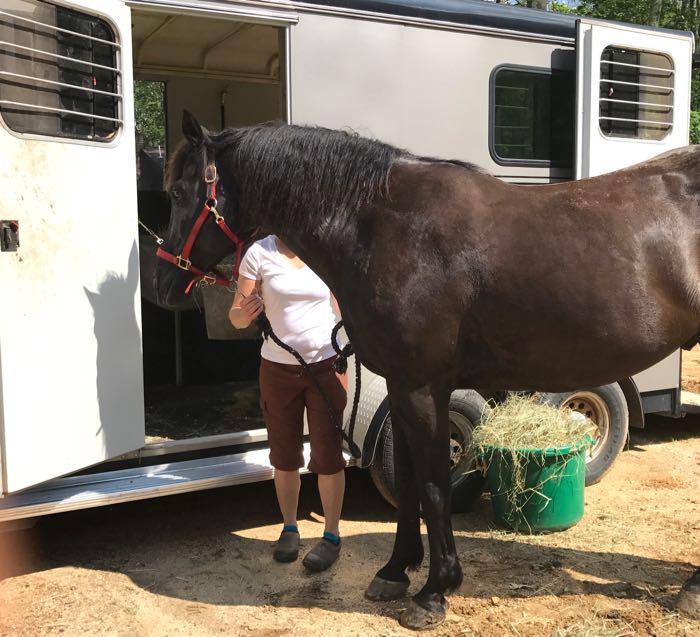
We retreated if he became nervous. The ramp was put down. Would he walk across it? Step up it? At one point I was able to lead him on, but then I made the mistake of pulling lightly on the lead rope, which triggered some memory, and he came flying out, eyes rolling and all four hooves off the ground.
He needed a security blanket. So we brought Lyle out. (I have to say here that I adore Lyle. Look at that face!)
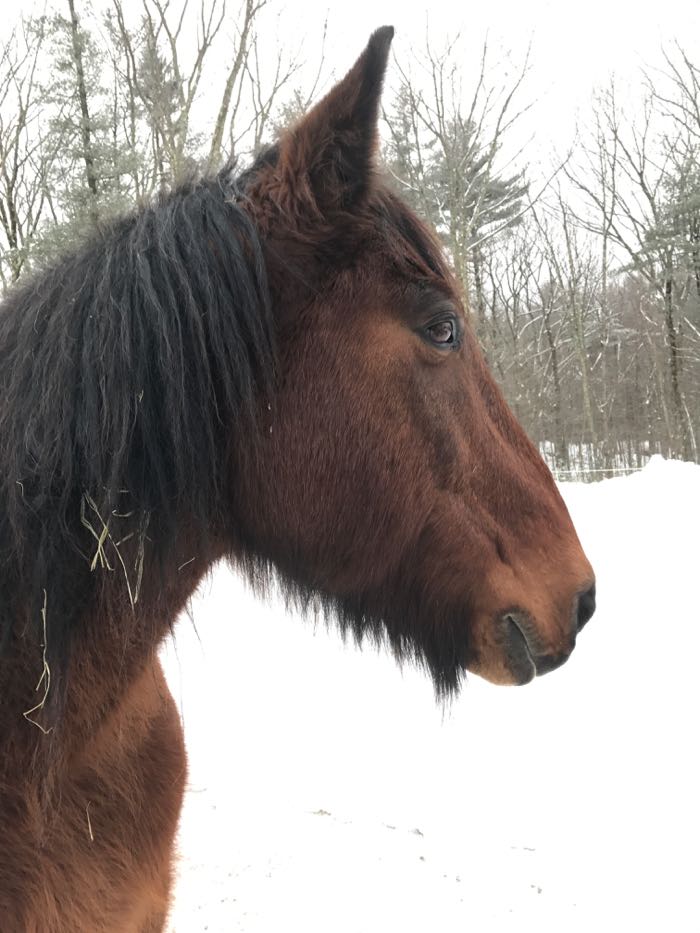
Lyle was just what Dee needed. But we didn’t go right to the trailer loading. First we let Dee see that Lyle liked being outside of the barn. We asked if he’d like to join him.
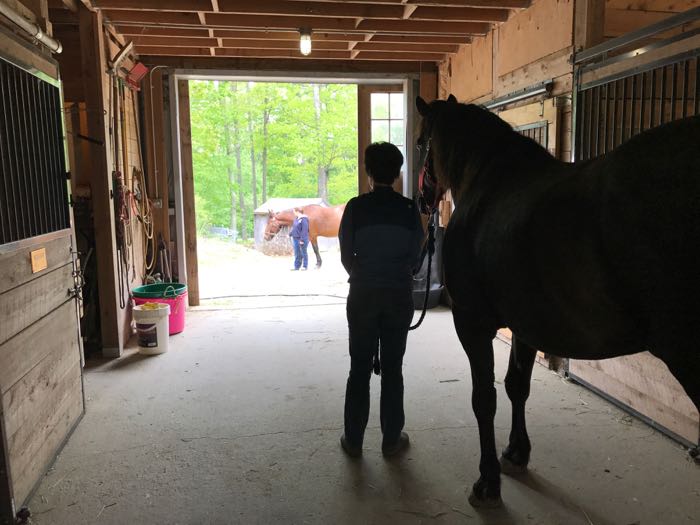
He did. We continued to ask Dee what he felt comfortable with. We continued to reward him for answering I can do that. We put Lyle on the trailer. Dee agreed to get on, too.
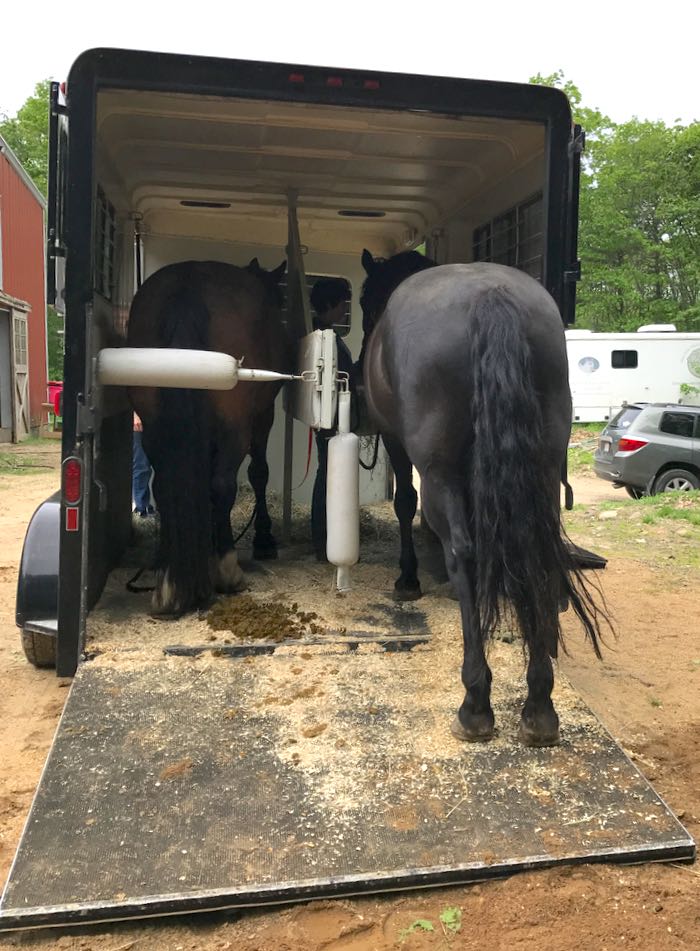
In between my visits, the owner did her homework. They both gained confidence. They listened to each other. He was associating the trailer with good things. We slowly increased the criteria. We could tie Lyle to the outside of the trailer and load Dee.
But the goal was to trailer Dee solo. He’s an awesome trail horse, and the owner likes to meet friends down the road and go for rides. She can’t take Lyle, too. Dee had to go on his own.
Going on his own is just what we did. On my last visit, Lyle not only walked right on – but self-loaded! We took him for a short drive, unloaded, then loaded up again and came home. Dee and his owner can now do what they both enjoy – meandering along trails with friends.
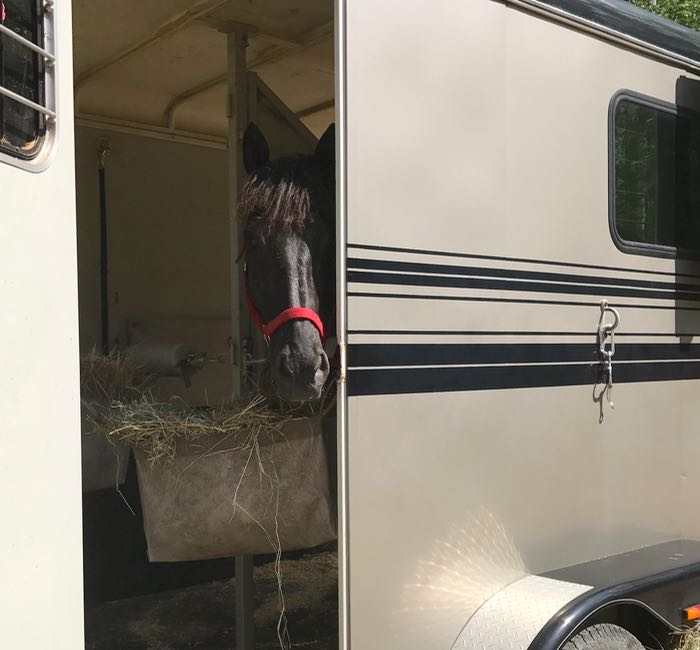
In order to achieve this, I did six training sessions, and the owner did her homework. This blog skips a lot of the details, but it’s not meant to be a trailering tutorial. Teaching Dee to get over his fear of the trailer needed doing after that first domino fell. Finding that first domino was what was important. Before you begin training any behavior, ask your horse Are you relaxed? If not, Why? It’s about paying attention to what your horse is telling you, and then finding a way to communicate with them so that they trust that you’re listening. Only from there can training happen so that everyone’s behavior is safe and fulfilling.
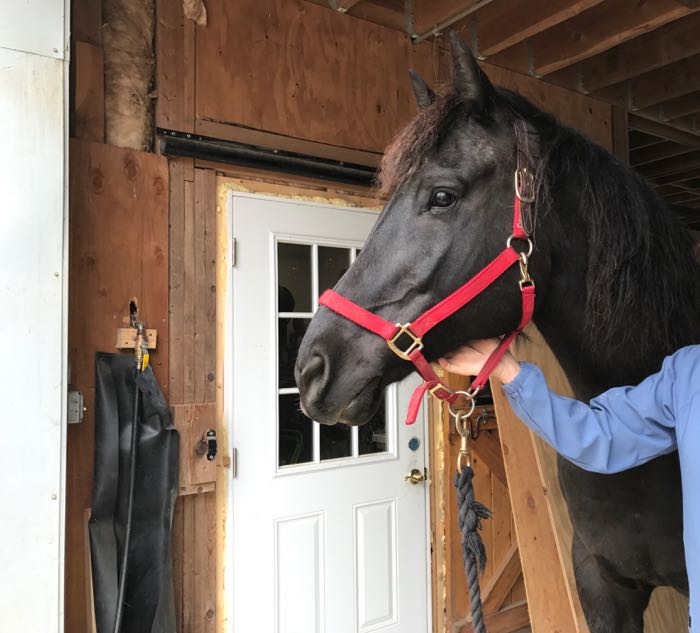
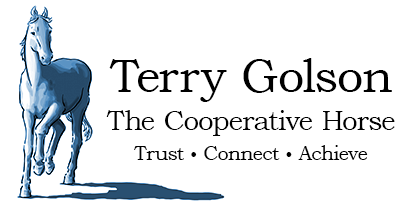

Wow! What a change!
Yes! This is what happens when a relaxed state is a prerequisite for other behaviors.
My horse loads like Tonka but I never take that for granted. Everytime Cider loads is a teachable moment I leaned from working with Terry. I am packed, organized and my safety check is done before Cider gets on so I’m not asking him to wait long before we get moving. I reward with a handful of carrot pieces in his hay when he self loads. It’s a thank-you as well so we can go explore new trails together.
Great point about managing the situation so that the trailering is easier. Simply thinking about parking in the shade so that the trailer is more comfortable matters. You’re the one who reminded me that halters left on the outside of the trailer can get too hot to put on after a ride. Small things add up. We also know not to blame the horse! Once your horse loads easily, not loading is an indication of a problem. Remember when Cider was hesitant to load because his hooves hurt?
Your post comes at an opportune time to remind people that one of the first things they should do with their horses is to make sure that they load into trailers – it could save their lives. Luckily, my boys self-load like Tonka. And thankfully, they are comfortable enough to do it under pressure as well, as we just learned the day before yesterday. I was working at home when I heard a siren, and looked out my front door to see fire coming down the hillside across the street toward my house. My daughter and I had the trailer hitched up and horses loaded inside in about 5 minutes, and drove out of the neighborhood just as the air tankers were coming in to drop retardant and water. Fortunately for us, our wonderful firefighters on the ground and in the air stopped the fire right across the street from my house, and we had no damage at all. And thankfully no homes were lost, but a couple of our neighbors had fire come right through their property and literally right up to their doorsteps before the firefighters stopped it. For me, trailer loading is just about the most important skill a horse should learn. Living in California, wildfires are a fact of life, and I’ve helped in enough emergencies and have seen firsthand that dealing with frightened animals that aren’t trailer broke (let alone halter broke!) just puts their lives and the lives of the humans trying to help them at risk. And the alternative is that the gate is left opened or the fence is cut, and you pray for the horses to find their way to safety, as some of my neighbors this week found out. People should care for their animals enough to be sure that they have the skills necessary to save their lives in an emergency!
Well said, trailer loading is really important, ideally they would load into any kind of trailer easily. Happily your property escaped damage. We have wild fires here, especially with the drought, but it’s hardwood forests and the fires aren’t anything like the ones you have.
Terry, interesting, informative post as usual.
I hope your area is spared during wildfire season!
What a story! I am so glad that you, your animals and your neighbors are okay! Yes! to how important it is to be able to load quickly when there’s an emergency – and not just environmental. I know someone with a horse that colicked and needed to go to the vet hospital. It took 3 hours to load her. Ideally, the trust account and the training you’ve put into your horse can be called on during that emergency so that the horse will literally go through fire with you.
Thank you… awesome help . Will be a regular follower from now too….
Thank you, Nan. If you’re on social media, please share. I’d love to get this perspective out to more people.
Great post, even for someone who doesn’t have a horse. I can see how important this especially after Laura’s comment.
Having a plan for emergencies is important for all households, even those with smaller (and feathered) friends 🙂
You are right of course and I have now got all my girls used to me picking them up from time to time so that if I need to I can, without chasing them around.
GREAT post. One of the most important details is that you provided a path to success and (most importantly!!) the owner did her homework! It’s one thing for a trainer to get a horse to load (or cross a bridge, or do a flying change, or anything else). It’s something completely different for the horse’s owner to invest the time and energy to build the relationship that allows for a successful partnership.
Kudos!
Yes! The owner did her homework – and followed my timeline. I had another client with a horse that tensed at the sight of a saddle pad. I instructed him not to do anything other than grooming for the week. That was too slow for him, and he didn’t call me back. Another client is self-aware enough to know that she doesn’t have the patience for this early work. So I did it, and once her mare was in a good mental space, I was able to bring the owner into the work.
Hi, I have owned my horse for 21 years. We have do a lot of trail riding , hunter paces etc.. but to this day, I always have a difficult time loading him. He goes up on his two hind feet like the horse Fury / Flicker from my childhood days. Anyway, It takes forever. He doesn’t like to be alone in the trailer that is the main problem, but I don’t have a 2nd horse any longer so he has to learn to go in alone. also, my old trainer used to muscle him on the trailer with a lunge line behind his butt. It’s hard on the poor guy, because many times we have trailered to the large animal hospital, so part of him says she’s gonna sell me out here.. and take me for another scary event.
When a horse has been through what yours has, it’s very hard to retrain. If at all possible, can you leave the trailer in his paddock and put his hay near it? Eventually (when he acts as if it’s not there) feed him in it.
I have a new trailer that my horse, Moo, has loaded on once and now won’t load. I’ve been patient with her but just don’t understand why she now has an issue. I open everything possible to make it bright, I put fresh hay in the manger, i let her stand and look..she walk up to it but won’t step in. I tie her to the trailer when I tack her and we ride around on my property or out back. I have tied her companion, Pokey (a donkey) to the trailer to see if she will load and it is still no deal. Note..Pokey won’t load either but I have never really worked with her on that. My trailer is a step up 2 horse straight load. Any ideas?
If you apply pressure on the halter does she balk, or does it escalate to fear and panic? Sometimes horses become fearful of stepping up onto a platform. They also anticipate how scary it will be to back off. Can you build a wooden platform to practice going on and off? It’d be a fun obstacle to have anyway! Also, is there a small rise that you could park the trailer on so that there’s not so much of a step up?